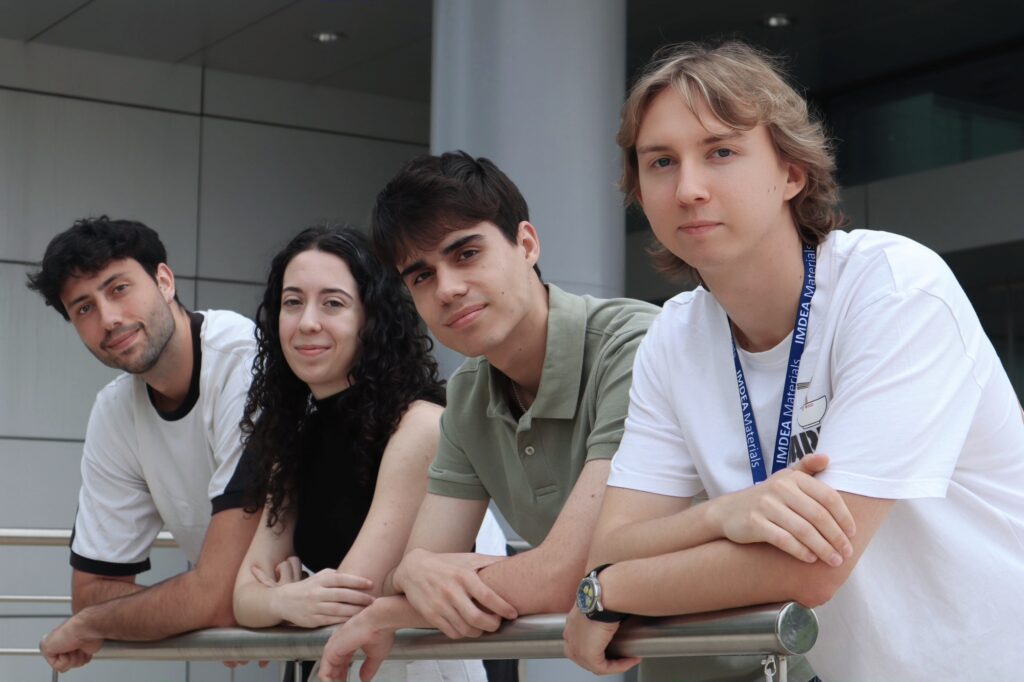Every year, the IMDEA Materials Institute offers talented university students the opportunity to take their first steps into the world of scientific research through its Research Initiation Scholarships (RIF).
For three months, participants join cutting-edge research groups, develop real projects, and train in an international, collaborative, and highly specialised environment.
In this 2025 edition, four students have been selected to take part in the program. Their projects cover diverse areas such as microstructure modelling in superalloys, robotic laboratory automation, nanowire development for energy applications, and biomaterials for medical uses.
Enrique Dios: accelerated simulations for the aerospace sector
Enrique Dios, a student in the qualifying master’s degree in Aeronautical Engineering, was already familiar with IMDEA Materials from a previous stay.
This summer, he has returned to the Institute to work on a project that combines computational fluid dynamics (CFD), high-performance computing, and technology transfer to the industrial sector.
“As soon as I found this particular topic, I applied immediately, as it closely aligns with the profession I want to pursue in the near future,” he said.
“My current project consists of developing a proof of concept to demonstrate the possibility of adapting a solidification model developed here at IMDEA to a well-known commercial CFD software.”
The experience is also enabling him to acquire key skills for his professional future, such as using GPU-accelerated simulations and the Institute’s HPC cluster.
Desiree Rivera: robotics and automation in the laboratory
For Desiree Rivera, combining her background in biomedical engineering with her interest in automation made IMDEA Materials the ideal place.
“I’m excited to work in a leading environment in innovation and materials science. Its approach perfectly fits my training,” she says.
The project she is involved in consists of automating laborious and time-consuming laboratory processes. It relates to her university training, as it combines her experience in biological and chemical laboratories with the use of robotics and programming.
Specifically, her work focuses on automating laborious experimental processes in the lab, using collaborative robots and intelligent systems.
“I hope to gain practical experience in experimental automation, collaborative robotics, and the design of automated experiments,” she adds. “I also want to consolidate my skills in multidisciplinary research and actively contribute to the progress of the project.”

Alexei Caballero: control of metallic nanowires for energy applications
Alexei Caballero, a Materials Engineering student, has joined the Multifunctional Nanocomposites Group to work on developing new metallic catalysts aimed at controlling the polytypes and size distribution of nanowires.
These nanowires are produced using the Floating Catalyst Chemical Vapour Deposition (FCCVD) technique.
His project allows him to directly apply the knowledge acquired during his studies in synthesis, characterisation, and materials design. “IMDEA Materials is one of the leading research centres in Spain. Also, here I can develop and enhance my skills in the scientific and technological field,” he said.
“I haven’t been here long, but I’m still very impressed by the size of the centre and its infrastructure, but above all, the international and collaborative atmosphere, with researchers from multiple nationalities working together.”
Carlos Calvo: magnesium nanoparticles for biomedical applications
Carlos Calvo, who studies biomedical engineering, is working on magnesium-based nanoparticles for controlled drug release and other biomedical applications.
“The Institute’s focus on biomaterials perfectly matches my academic background and interests,” he affirms.
His work includes practical laboratory experience in materials characterisation, as well as learning advanced techniques used in real research environments.
“The opportunity to grow scientifically and technically while contributing to a real project is incredibly valuable,” Carlos comments. “And the team’s support has been excellent.”
“The people, the lab infrastructure, and the international atmosphere. It’s an ideal place to learn and grow.”
The RIF program not only offers a first research experience but also represents a gateway into the world of science for young people with a vocation. Whether in aerospace, energy, health, or automation, the participants in this edition are actively contributing to projects with high social and technological impact.
“These scholarships allow students to develop key skills in a cutting-edge environment and collaborate with experts in scientific and technological fields of great relevance,” highlights Rosa Bazán, Head of Human Resources at IMDEA Materials.
The call for the 2026 RIF Scholarships will open next spring.
